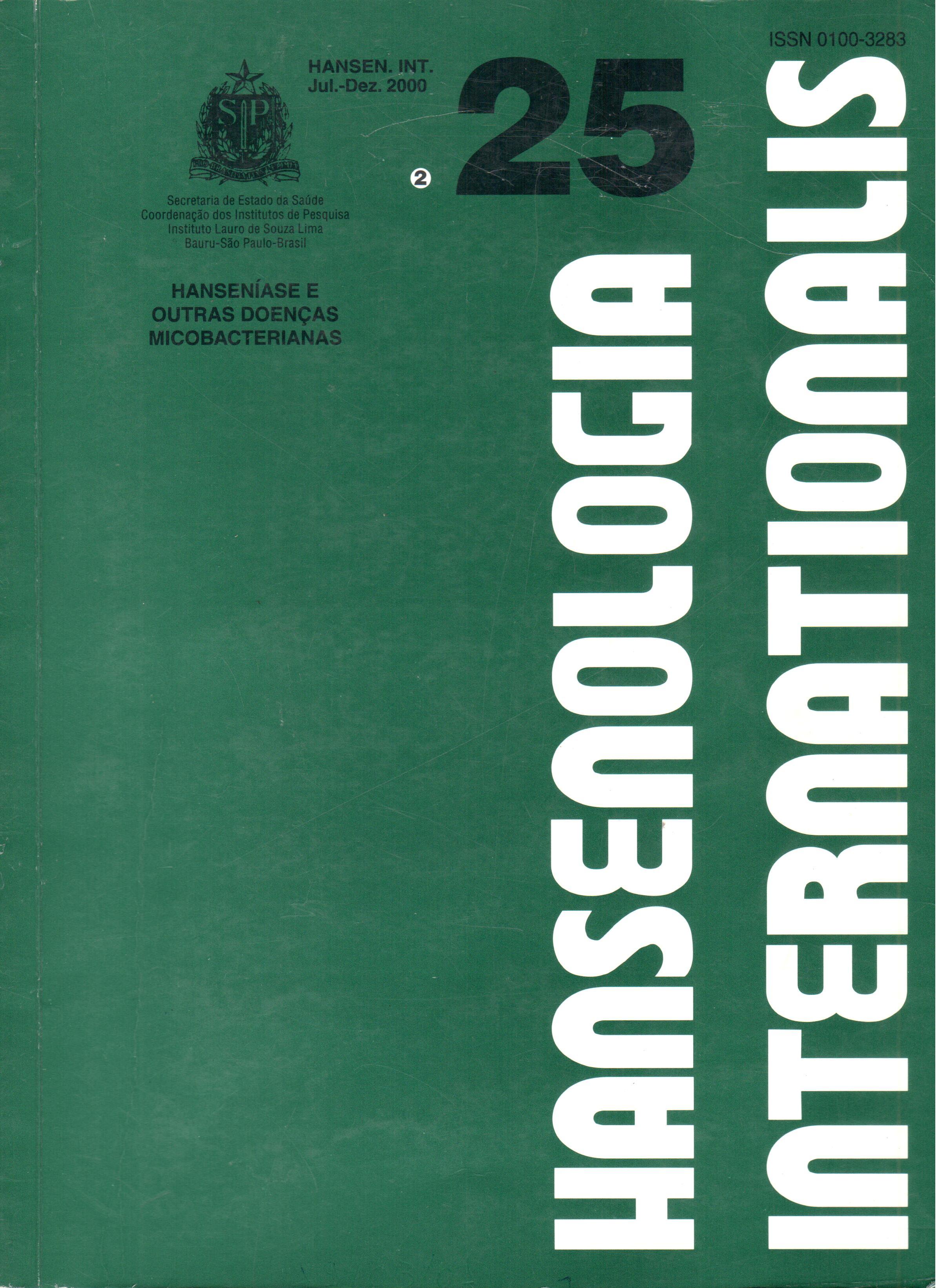Resumo
No presente estudo avaliamos a distribuição fenotípica do grupo sanguíneo Lewis na saliva e nos eritrócitos de pacientes hansenianos. Foram
analisados 47 pacientes e 40 indivíduos controles quanto a presença de antígenos ABH bem como dos antígenos Lewis nos eritrócitos e na saliva, pela reação de aglutinação e inibição de aglutinação. As freqüências dos fenótipos Lewis e secretor/não secretor nesses pacientes e no grupo controle foram: Le(a- b+) = 29,8% (62,5%); Le(a+ b-) = 25,5%(7,5%); Le(a- b-) = 44,7% (30,0%); secretor = 59,5% (85%) e não secretor = 40,5% (15%). Em análise do x2 encontramos diferença significativa tanto para o fenótipo Lewis como para o fenótipo secretor, em relação ao grupo controle
respectivamente: x2 = 10,46; GL = 2; p = 0,005 e x2 = 5,64; GL = 1; p = 0,018. Da mesma forma, o teste Z de proporções foi realizado obtendo resultados significativos para os fenótipos Le (a+ b-) e Le (a- b+) , que foram respectivamente: Z = 2,219; p = 0,027 e Z = 3,058; p = 0,002. Os
resultados indicam que o fenótipo Le (a+ b-) parece estar associado à suscetibilidade à hanseníase e fenótipo secretor com proteção. Discute-se que a presença de Leb na saliva pode inibir a aderência do M. leprae às células da mucosa, protegendo assim contra infecção.
Referências
2. ANDRESEN, P. H. The blood group system L. A new blood group L2. A case of epistasy within the blood groups, Acta path. Microbial. Scand., v.25, p 728-731, 1948.
3. BEIGUELMAN, B. Sistema ABO e epidemiologia de lepra. Rev. paul. med., v.65, n.2; p,80-86, 1964.
4. BEIGUELMAN, B, Leprosy and genetics - review. Braz. J. genet., v,6, n.1, p,109-172, 1983.
6. BETH VINCENT, Técnicas aplicadas à imuno-hematologia eritrocitária. In, Alves de Lima, L., Callado,M, R, L., Santos, J, A, Curso de Imuno-ematologia. Botucatu. Faculdade de Medicina, p. 122, 1992.
8. BLACKWELL, C.C. Genetic susceptibility to infections agents, Proc. Proy. Coll. Phys. (Edinburgh), v19, p.129-138, 1989.
7,CHAIN, W, FOXMAN, B., SOHEL, JD, Association of recurrent vaginal candidiasis and secretory ABO and Lewis phenotype. J. Infect Dis., v,17; n.3, p,828-30, 1997,
8. CONGRESSO NACIONAL DE LEPROLOGIA 6s, Madrid, 1953. Memória. Madrid, Association International de Lepra, 1953. 1344p.
9. CRITCHLEY, I, A. AND DOUGLAS, L.J, Role of glycosides as epithelial cell receptors for Candida albicans. J. Gen. Microbial., v.133, p.637-643, 1987
10, DUNSFORD, I., BOWLEY, C,C, apud SALDANHA, S,G, ABO blood groups and salivary secretion of ABH substances among three racial groups in São Paulo, Rev. Brasil. Genet., v,1, p.175-186, 1982,
11. ELLISON, R.C,, ZHANG, Y., MYERS, R,H,, SWANSON, J.L,, HIGGINS, M., ECKFELDT, J, Lewis blood group phenotype as an independent risk factor for coronary heart disease (the NHLBI family heart study). Am. J. Cardiol; v,83; n.3; p,345-8, 1999.
13. FEITOSA, M.F. , KRIEGER, H, , BEIGUELMAN, B. Epidemiologia genética da hanseníase e da reação de Mitsuda, Hans. Internat., v.20; n,2, p,5-8, 1995,
15. GAFFNEY, R,A,, SHAEFFER, A.J., DUNCAN, J,L. Lewis blood group antigen expression by cultured normal uretral epithelial cells, J. Urology, v.148, p,1341-46, 1992
16. GIBBONS, R,J,, QURESHI, J,V. Selective binding of blood group-reactive salivary mucins by Streptococcus mutans and other oral organisms, Infect. Immun., v.22, p.665-671, 1978.
17. HENRY, S., ORIOL, R., SAMUELSSON, Bo, Lewis histo-blood group system and associated secretory phenotypes - Review. lox Sang, v.69, p.166-182, 1995.
18. JACOBSON, S.H,, LOMBERG, H. Over-representation of blood group non-secretors in adults with renal scarring, Scand. J. UroL Nephrol., v,24, p.145-150, 1990.
19. KABAYASHI, C., SAKAMOTO, J. KITO, T,, YAMAMURA, Y,, KASHIKAVA, T., FUJITA, M,, WATANABE, T,, NAKAZATO, H,, Lewis blood group — related antigen expression in normal gastric epithelium, intestinal metaplasia, gastric adenoma and gastric carcinoma, Am. J. Gastroenterology, v,88; n.6, p.919-924, 1993
20. KALLENIUS, G,, SVENSON, S,B,, MÖLLBY, R., CEDERGREN, B., HULTBERG, H., WINBERG, J, Structure of carbohidrate part of receptor on human uroepi thel ial cel ls for pyelonephritogenic Escherichia colt. Lancet. v.2, p.604-606, 1981.
19.KAUFFMANN, F., FRETTE, C,, PHAM, Q,T., NAFISSI, S,, BERTRAND, J.P., ORIOL, R. Associations of blood grouprelated antigens to FEV1, wheezing and asthma, Am. J. Resp Crit Cure Med., v.153,, p.76-82, 1996
20.LEE, C, H,,HAGEN, M. A,, CHONG, B. H,, GRACE, C. S. ROZEMBERG, M, C,The Lewis system and secretor status in autoimmune hemolytic anemia complicating infectious mononucleosis. Transfusion, v,20; n.3, p,585-588, 1980.
21.MOLLISON, P.L, Blood transfusion in clinical medicine, Oxford, Blackwell Scientific Publications, 1979,
22.MOURANT, A,E, A "new" human blood group antigen of frequent occurrence, Nature, Lond, v,158, p.237, 1946,
23.MOURANT, A.E., KOPEC, A,C,, DOMAMIEWSKA-SOBEZA, K, Oxiford University Press, The blood groups and other polymorphic systems, 1978.
24.ROBINSON, C.B., MARTIN, W,R., RATLIFF, J,L., HOLLAND, P.V., WU, R,, CROSS, C. E. Elevated levels of serum mucinassociated antigen in adult patients with cystic fibrosis, Am. Rev. Respir. Dis. v.148, p,385-89, 1993,
25.RUIZ, B., CORREA, P., FONTHAM, E.T,H,, ROOD, J. C, M A L C O M , G , T , , T O R R A D O , J , , P E R E Z , A . , RAMAKRISHNAN, T,, HUNTER, F. M, Ascorbic acid, Helicobacter pylori and Lewis phenotype among blacks and whites in New Orleans, Cancer Letters, v,83, p,323-29, 1994.
26.SHEINFELD, J,, SCHAEFFER, A,J., CORDONCARDO, C., ROGATKO, A., FAIR, W.R, Association of the Lewis-blood phenotype with recurrent urinary tract infections in women. N. Engl. J. Med., v,320, p,773-777, 1989,
27.SPIELMANN, W,, TEIXIDOR, D., RENNINGER, W, MATZNETTRE, T, Blutgruppen und Lepra bei moçambiquanischen Võlkerschaften, Hummangenetik,
v.10, p.304-317, 1970.
28.WIENER, A.S, Blood groups and disease, Lancet., v,1., p,813-816, 1962.

Este trabalho está licenciado sob uma licença Creative Commons Attribution 4.0 International License.
